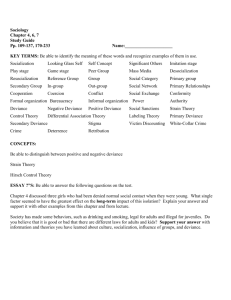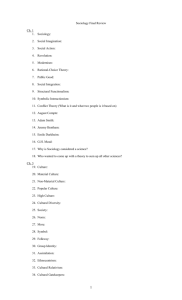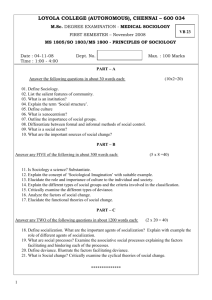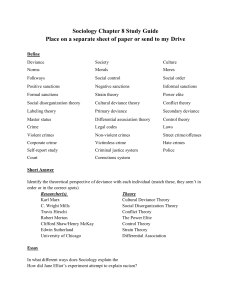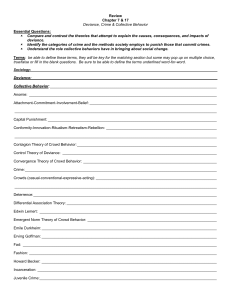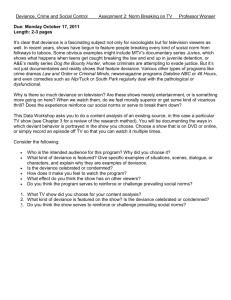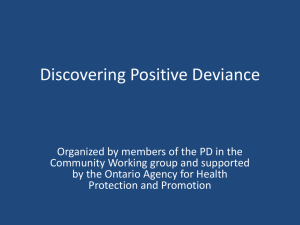Winter 2010
advertisement
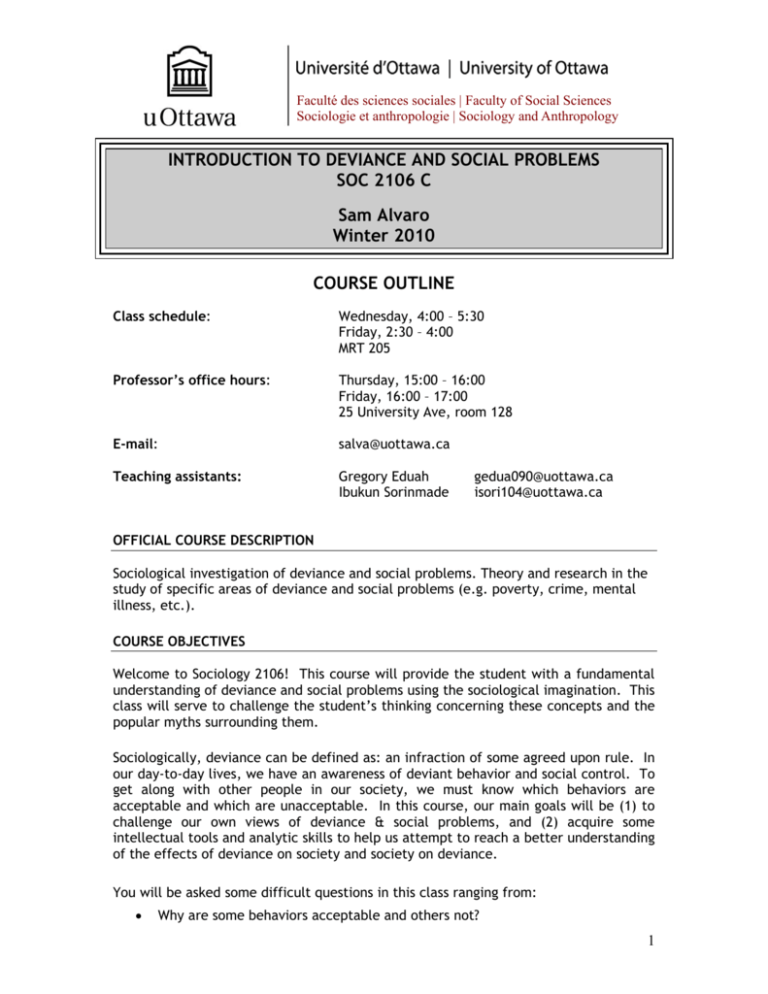
Faculté des sciences sociales | Faculty of Social Sciences Sociologie et anthropologie | Sociology and Anthropology INTRODUCTION TO DEVIANCE AND SOCIAL PROBLEMS SOC 2106 C Sam Alvaro Winter 2010 COURSE OUTLINE Class schedule: Wednesday, 4:00 – 5:30 Friday, 2:30 – 4:00 MRT 205 Professor’s office hours: Thursday, 15:00 – 16:00 Friday, 16:00 – 17:00 25 University Ave, room 128 E-mail: salva@uottawa.ca Teaching assistants: Gregory Eduah Ibukun Sorinmade gedua090@uottawa.ca isori104@uottawa.ca OFFICIAL COURSE DESCRIPTION Sociological investigation of deviance and social problems. Theory and research in the study of specific areas of deviance and social problems (e.g. poverty, crime, mental illness, etc.). COURSE OBJECTIVES Welcome to Sociology 2106! This course will provide the student with a fundamental understanding of deviance and social problems using the sociological imagination. This class will serve to challenge the student’s thinking concerning these concepts and the popular myths surrounding them. Sociologically, deviance can be defined as: an infraction of some agreed upon rule. In our day-to-day lives, we have an awareness of deviant behavior and social control. To get along with other people in our society, we must know which behaviors are acceptable and which are unacceptable. In this course, our main goals will be (1) to challenge our own views of deviance & social problems, and (2) acquire some intellectual tools and analytic skills to help us attempt to reach a better understanding of the effects of deviance on society and society on deviance. You will be asked some difficult questions in this class ranging from: • Why are some behaviors acceptable and others not? 1 • • • • What is deviance and is it a useful concept in today’s society? Why are some drugs illegal while others are not? Are terrorists heroes or criminals? What does inequality have to do with deviance? Informed discussion of these questions may surprise you!!! REQUIRED TEXTS Text: Thio, Alex. (2010) Deviant Behavior Tenth Edition. Toronto: Prentice Hall. Please note that this book is available at Benjamin Books on Osgoode St., next to the Father and Sons Restaurant. There is a course reader for this class and can be purchased at Rytec at 404 Dalhousie St. Additional Readings: Additional readings will be announced throughout the course and will be placed on reserve in the library. QUESTIONS AND CONCERNS I will be available outside of class hours for questions regarding the class and its materials. My office hours will be held Thursdays 15:00 – 16:00 and Fridays 16:00 to 17:00 my office is at 25 University Ave, Room 128. To contact me outside of class and office hours, I can be reached via email at salva@uottawa.ca. If you do email me, please indicate the course code in the email subject heading. In addition, email is not a preferred method of communication; email should be used in situations where quick responses can be made to singular questions. If you do not receive a response within 24 hours, assume that I did not get your email and resend it. Also, please do not send me any attachments. COURSE EXPECTATIONS Students are expected to read the material, attend class, take notes, ask questions, and, engage in class discussions of the topics and themes that form the basis of this course. This means taking part in a professional and informed debate or discussion with one’s classmates. Occasionally, and without warning, I will call upon students to discuss a point or contribute to a discussion, so please be prepared. Note: in the past I have given bonus marks for outstanding participation during various in-class activities. Course notes are the responsibility of each student. The lectures are not posted on any website, nor are they made available through the library reserve. If you are unable to attend a lecture, you should make the effort to obtain notes from a classmate. Students will be responsible for all assigned readings and material presented in class, including this outline. All students are required to have a university email and internet account. Please contact the University computing center if you do not have one. Please ensure whatever email address you choose to use is one that will work with your university account (if not this account then your university account should be forwarded to your main account). 2 The dates for evaluations are indicated below. If you are unable to turn in any of the assignments on the dates as scheduled below, it is strongly recommended that you consider taking the course at a more convenient time. You must complete all of the assignments in order to obtain credit for this course. Failure to complete all of the components of evaluation will result in an incomplete being assigned for the course. METHODS OF EVALUATION AND DUE DATES Mid-Term Examinations (2x30=60%) – There will be two Mid-Term examinations scheduled during the regular class period on February 10 and March 24, 2010. Final Examination (40%) Official Examination Period The final examination will be held during the official examination period. This examination will be based on all material presented in class and assigned readings during the term. Note: Students should expect a two week turn around for marked evaluations SUPPLEMENTAL AND GRADE RAISING EXAMINATIONS ARE NOT AVAILABLE COURSE OUTLINE Date Jan 6 Jan 8/13 Readings Jan 15/20 Readings Jan 22/27 Readings Jan 29/Feb 3/5 Readings Feb 10 Feb 12/24 Readings Feb 26/Mar 3 Readings Mar 5/10 Readings Mar 12/17/19 Readings Lecture Topic Introduction to the Course Deviance and Social Problems Defined. Chapter 1 Reader: Bruce G. Link and Jo C. Phelan, (2001) Conceptualizing Stigma. Annual Review of Sociology. Vol. 27: 363-385. Positivistic Theories of Deviance Chapter 2 Constructionist Theories of Deviance Chapter 3 Extreme Deviance Chapters 4-6 Mid-Term Exam I Being Sane in Insane Places Chapter 7/8 Substance Abuse or Use Chapter 11/12 Reader: Chas Critcher. (2000) ‘Still raving’: social reaction to Ecstasy. Leisure Studies. Vol. 19: 145–162. Economic Deviance Chapters 13/14 Deviant Lifestyles Michael Jindra. (1994) Star Trek Fandom as a Religious Phenomenon Sociology of Religion. Vol. 55: 27-51. Donald Tricarico (1991) Guido: Fashioning an Italian-American Youth Style. Journal of Ethnic Studies. Vol. 19: 41-66. 3 Mar 24 Mar 26/31Apr 7 Readings Mid-Term Exam II Society and Sexuality Chapter 9/10/15 Reader: Judith Timson. (2005) Girls Gone Raunch. Macleans Vol. 118 (39) 3942. Reader: Marianne Apostolides, Rebecca F. Plante et al. (2008) Engaging in S & M Sexual Practices from Extreme Deviance. Edited by Erich Goode and Angus Vail, Pine Forge Press: London. Exam Review Apr 9 COURSE POLICES Students should review the undergraduate calendar, particularly the sections concerning requirements relating to courses. LECTURE HALL BEHAVIOR 1. Only one person should be talking at one time. If you must talk in class, you should do so in a quiet manner or pass notes. People who are disrupting class will be asked to leave. 2. All communication devices should be turned off, cell phones, pagers, etc. If you are expecting an urgent phone call, please sit near the door and you can leave the lecture hall. The only electronic equipment allowed, are computers for taking class notes. 3. Please feel free to eat or drink in class; however, please be as quiet possible. ASSIGNMENTS & EXAMINATIONS 1. If you fail to attend an examination or to hand in an assignment, contact the professor as soon as possible. Note the university does not consider missing an exam due to travel plans an acceptable excuse. 2. If you fail to attend an examination or hand in an assignment due to illness you must have a certified medical note dated for that day or prior. The medical note must be submitted within 5 working days of the absence. 3. If you miss an examination or fail to hand in an assignment for personal reasons, see an academic advisor as soon as possible – they will be able to help you. 4. Failing to complete an evaluation during the examination period will require you to fill out a deferral form and submit it to your faculty. 5. Student-athletes need to have a note from their coaches if they are going to miss an evaluation. 4 6. Students are asked to hand in typed assignments. As computers sometimes need to be fixed - you should always have a back up (either on a disk, memory stick or a printed copy). If your computer needs to be fixed near your deadline, you must have proof that you have been working on your assignment. You will need to show to the professor that you have been duly diligent in this situation to get an extension, for example by producing a completed draft of the assignment. 7. If you have an issue with the marking of your evaluations, see the person who marked it first and if you still have an issue then see the professor. Prior to meeting about your evaluation, you should have a typed, two-page summary of the issue you have with your evaluation, point out specifically where the issue is and what you believe the grade should be. In addition, asking for your grade to be reviewed does not guarantee that the grade will be raised. Your evaluation will be entirely reappraised and the grade can go up, down or stay the same. ACADEMIC VIOLATIONS 1. The University of Ottawa Academic Calendar states that: “Academic fraud is an act by a student, which results in a false academic evaluation of that student or of another student”. Please read the relevant sections concerning academic fraud in the Undergraduate Calendar. Last session, most of the students found guilty of fraud were given an “F” for the course and had between three and 12 credits added to their program requirements. 2. Plagiarism is a serious matter and will be dealt with accordingly. All material quoted or paraphrased from any source must be properly credited. The instructor also reserves the right to orally examine any student. 3. For more information on that which constitutes academic fraud as well as strategies for avoiding this act, students are encouraged to consult the: University of Ottawa website at http://www.uottawa.plagiarism.pdf or the Faculty of Social Sciences guide to avoiding plagiarism at: www.socialsciences.uottawa.ca/pdf/plagiarism2.pdf. WHERE TO GET HELP 1. If you are having problems with the class, see me during office hours or contact one of the teaching assistants. 2. If you are having general academic problems see the Centre for Academic Success or the Writing Centre. 3. If you are having other problems, see an academic advisor. 4. Accommodation for students with disabilities and/or special needs is available provided students requiring accommodation register first with the Centre for Special Services, 85 University room 339 (613) 562-5976. 5 An Article by Frank Furedi I refuse to hand it to students on a plate: Lectures must be a good starting point for inquiry, not an easy ride. Students are often confused and sometimes resentful when I tell them that I don't have any lecture notes to hand out. Back in January, I received an email from one aggrieved individual who was offended because I refused to send her the notes from one of my lectures. Even though she was not a student at my university, she felt that there was a universal entitlement to possess my lecture notes. Between you and me, I have to confess that my notes are barely decipherable. They usually consist of two sides of A4. Normally I work out six or seven important themes and scribble down three or four points to illustrate them. I then leave it for a few weeks and, in the intervening time between writing the notes and delivering the lecture, I add ideas here and there. It may sound like a cop-out, but they are notes that are continually in a state of evolution, rather than a finished product. And I do not think that - at least in my discipline, sociology - they should represent the final word on a topic. But the main reason I don't hand out my notes has little to do with my reluctance to part with unfinished work. In principle, I think handing out lecture notes is a really bad idea. Indeed, I would say that the current custom of distributing lectures or putting notes and slides on the web symbolizes the growing estrangement of universities from a culture of studying. Handouts are the equivalent of the idiot's guides of yesteryear, best exemplified by the sixpage summary of Plato's Republic I received as a second-year undergraduate. A handout culture helps foster a climate where ideas are not taken seriously. There are a number of compelling reasons why handing out notes sends the wrong signals to students. Students should at least attempt to interpret lectures. The act of interpretation is important for learning how to engage with new ideas. Taking lecture notes is in itself an important exercise of interpretation and discrimination: learning to distinguish between essential and non-essential points ensures that a lecture does not become a passive experience. Some students don't take any notes or hardly any at all. In some cases, this may be due to laziness or because they are distracted by other things. In others, it may represent the astute observation that very little of significance was transmitted through the lecture. Whatever the approach adopted, a good lecture serves as a point of departure for thinking about the subject. What constitutes a good starting point is not necessarily the last word on the subject. Inexperienced lecturers sometimes say too much. And often we are tempted to finish our lecture with a decisive summary of the subject. 6 Sometimes this tactic is appropriate, but leaving a few issues up in the air helps encourage students to go off and think for themselves. I hope that they will leave the lecture hall enthused and follow up a lecture by reading a few texts. Lectures should serve as a catalyst, not as a definitive statement. Handing out lecture notes is a bad idea for three more reasons. The availability of such notes discourages studying and reading. It also encourages a habit of taking short cuts. Instead of studying and working through problems, students are encouraged to internalize ready-made answers and conclusions. Finally, and not unimportantly, the distribution of notes serves as a disincentive to attend lectures. But is that necessarily a problem? I think it is, since lectures and seminars can serve as a common focus for student discussion. They are the experiences that students have in common as part of an academic community. Do we really want to blow this away just because we want an easy life? First published in the Times Higher Education Supplement, 25 March 2005 7 Resources for you Mentoring Centre - http://www.sciencessociales.uottawa.ca/mentor/fra/ The goal of the Mentoring Centre is to help students with their academic and social well being during their time at the University of Ottawa. Regardless of where a student stands academically, or how far along they are in completing their degree, the mentoring centre is there to help students continue on their path to success. A student may choose to visit the mentoring centre for very different reasons. Younger students may wish to talk to their older peers to gain insight into programs and services offered by the University, while older student may simply want to brush up on study and time management skills or learn about programs and services for students nearing the end of their degree. In all, the Mentoring Centre offers a place for students to talk about concerns and problems that they might have in any facet of their lives. While students are able to voice their concerns and problems without fear of judgment, mentors can garner further insight in issues unique to students and find a more practical solution to better improve the services that the Faculty of Social Sciences offers, as well as the services offered by the University of Ottawa. Academic Writing Help Centre - http://www.sass.uottawa.ca/writing/ At the AWHC you will learn how to identify, correct and ultimately avoid errors in your writing and become an autonomous writer. In working with our Writing Advisors, you will be able to acquire the abilities, strategies and writing tools that will enable you to: • Master the written language of your choice • Expand your critical thinking abilities • Develop your argumentation skills • Learn what the expectations are for academic writing Career Services - http://www.sass.uottawa.ca/careers/ Career Services offers various services and a career development program to enable you to recognize and enhance the employability skills you need in today's world of work. Counselling Service- http://www.sass.uottawa.ca/personal/ There are many reasons to take advantage of the Counselling Service. We offer: • Personal counselling • Career counselling • Study skills counselling Access Service - http://www.sass.uottawa.ca/acces/ The Access Service contributes to the creation of an inclusive environment by developing strategies and implementing measures that aim to reduce the barriers to learning for students who have learning disabilities, health, psychiatric or physical conditions. Student Resources Centres - http://www.communitylife.uottawa.ca/en/resources.php The Student Resources Centres aim to fulfill all sorts of students needs. 8 Beware of Academic Fraud! Academic fraud is an act committed by a student to distort the marking of assignments, tests, examinations, and other forms of academic evaluation. Academic fraud is neither accepted nor tolerated by the University. Anyone found guilty of academic fraud is liable to severe academic sanctions. Here are a few examples of academic fraud: • engaging in any form of plagiarism or cheating; • presenting falsified research data; • handing in an assignment that was not authored, in whole or in part, by the student; • submitting the same assignment in more than one course, without the written consent of the professors concerned. In recent years, the development of the Internet has made it much easier to identify academic plagiarism. The tools available to your professors allow them to trace the exact origin of a text on the Web, using just a few words. In cases where students are unsure whether they are at fault, it is their responsibility to consult the University’s Web site at the following address: http://www.socialsciences.uottawa.ca/eng/writing_tools.asp « Tools for Writing Papers and Assignments ». Persons who have committed or attempted to commit (or have been accomplices to) academic fraud will be penalized. Here are some examples of the academic sanctions, which can be imposed: • a grade of « F » for the assignment or course in question; • an additional program requirement of between 3 and 30 credits; • suspension or expulsion from the Faculty. Last session, most of the students found guilty of fraud were given an « F » for the course and had between three and twelve credits added to their program requirement. For more information, refer to: http://www.uottawa.ca/academic/info/newsletter/fraud_e.html 9 Student Information Sheet Please answer the questions below and return this sheet to the instructor. Last Name: _______________________ First Name: _____________________ Email: ______________________________________ Major: _______________________________________ Why are you taking this class? ________________________________________________________________ ________________________________________________________________ ________________________________________________________________ ________________________________________________________________ ________________________________________________________________ ________________________________________________________________ ____________________________________ What do you hope to get out of this class? ________________________________________________________________ ________________________________________________________________ ________________________________________________________________ ________________________________________________________________ ________________________________________________________________ ________________________________________________________________ ____________________________________ Is there any topic you would like covered this class or do you have a special interest in one particular topic? ________________________________________________________________ ________________________________________________________________ ________________________________________________________________ ________________________________________________________________ ________________________________________________________________ ________________________________________________________________ ____________________________________ 10
